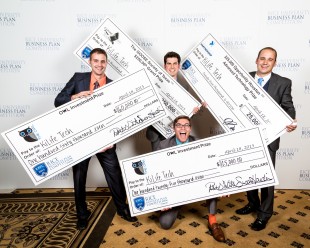NEWS RELEASE
David Ruth
713-348-6327
david@rice.edu
Mary Lynn Fernau
713-348-5374
mlfernau@rice.edu
KiLife Tech from BYU wins 2015 Rice Business Plan Competition
Nearly $1.5 million awarded at world’s richest, largest student startup competition
KiLife Tech from Brigham Young University emerged as the top startup company in the Rice Business Plan Competition (RBPC) Saturday at Rice University’s Jones Graduate School of Business. The annual event is the world’s richest and largest student startup competition.

KiLife Tech from Brigham Young University won the 2015 Rice Business Plan Competition. Photo courtesy of ShauLin Photography.
Selected by 275 judges from the investment sector as representing the best investment opportunity and taking home $500,000 in cash and prizes, KiLife Tech bested 41 other competitors hailing from some of the world’s top universities. KiLife Tech developed the Kiband, a smartband for parents concerned about keeping track of young children in crowded public spaces.
MyHelpster from University of Manchester won the new $5,000 online People’s Choice Competition. The winner was determined by more than 20,000 people who voted for their favorite team via a Facebook survey held March 23 through noon U.S. CDT today.
The prizes were presented tonight at a banquet at the Omni Houston Hotel that concluded the three-day event, which began April 16.
This year’s competitors were the most diverse in the history of the competition and came from top universities around the globe. The teams were chosen from more than 400 entrants to compete in four categories: life sciences; information technology/Web/mobile; energy/clean technology/sustainability; and other. Each team made its case in 15-minute investment pitches and a rapid-fire 60-second elevator-pitch contest on the first night of the competition.
Since the RBPC’s inception in 2001, when nine teams competed for $10,000, more than 155 former competitors have gone on to successfully launch their ventures and are still in business today; another 15 have successfully sold their ventures. Past competitors have raised in excess of $1.3 billion in funding and created more than 2,000 new jobs.
The 15th annual RBPC was hosted by the Rice Alliance for Technology and Entrepreneurship and the Jones School.
The top six finalists based on the judges’ overall score in the 2015 RBPC are listed below, along with the total amount the team won in prizes:
KiLife Tech, Brigham Young University — grand prize with a total value of $588,000.
KiLife Tech developed the Kiband, a smartband for parents concerned about keeping track of young children in crowded public spaces.
The grand prize includes:
- $250,000+ Investment Prize from The GOOSE Society of Texas.
- $250,000+ OWL Investment Prize.
- $50,000 from TMCx Accelerator.
- $25,000 Technology Award from Opportunity Houston and Greater Houston Partnership.
- Marketing and design services provided by BrandExtract and The Padgett Group ($25,000).
- Website development and hosting services for one year provided by ContentActive ($30,000).
- Treasury services provided by Bank of America ($5,000).
- Business Plan software provided by Palo Alto Software.
- Opportunity to ring the closing bell at the NASDAQ Stock Market in New York.
- In addition, the team will receive more than $150,000 in services.
Inscope Medical Solutions, University of Louisville — second place and $73,000, awarded by one of the sponsors of the first RBPC in 2001, Finger Interests.
Leveraging 35 years of combined experience in the health care industry, Inscope Medical developed an innovative laryngoscope that integrates several devices into one to improve patient outcomes for airway intubation.
Hyliion, Carnegie Mellon University — third place and $162,500.
Hyliion is creating an add-on hybrid module for tractor trailers that can reduce fuel costs by over 30 percent. Its product is intended to improve the driver’s quality of life as well as reduce harmful greenhouse gas emissions.
Veritas Medical, University of Utah — fourth place and $137,100.
Veritas Medical is a medical device company that has developed a groundbreaking technology using light to sterilize medical devices and prevent hospital-acquired infections.
DexMat, Rice University — fifth place and $64,000.
DexMat manufactures high-performance carbon nanotube fibers as a stronger, more flexible and lightweight replacement for old-fashioned metal wires that are currently being used in aerospace cables.
Aerox, Thammasat University — sixth place and $31,000.
Aerox manufactures A-Shield Silica Aerogel, a NASA-grade insulation at only 10 percent of the cost. According to Aerox, their product unlocks an opportunity in building material worth $37 billion.
For more information about the RBPC, visit http://alliance.rice.edu/rbpc.aspx.
-30-
Follow Rice News and Media Relations on Twitter @RiceUNews.

